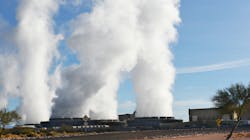Arizona Project to Demo Hydrogen from Nuclear Power
The U.S. Department of Energy (DOE) earlier this month reported that it is awarding $20 million in funding to demonstrate technology to produce hydrogen from nuclear power.
Part of DOE’s “H2@Scale” initiative, the Arizona-based project will advance the federal agency’s “Hydrogen Shot” goal of achieving a $1 cost per 1 kilogram of hydrogen in one decade. DOE’s Hydrogen and Fuel Cell Technologies Office (HFTO) will award the PNW Hydrogen LLC-led project $12 million, with DOE’s Office of Nuclear Energy (NE) providing the remaining $8 million.
“Developing and deploying clean hydrogen can be a crucial part of the path to achieving a net-zero carbon future and combating climate change,” remarked Deputy Secretary of Energy David M. Turk. “Using nuclear power to create hydrogen energy is an illustration of DOE’s commitment to funding a full range of innovative pathways to create affordable, clean hydrogen, to meet DOE’s Hydrogen Shot goal, and to advance our transition to a carbon-free future.”
DOE pointed out the project will produce hydrogen from nuclear power at the Palo Verde Nuclear Generating Station, a Phoenix-area facility owned by the electric utility Arizona Public Service. The agency noted that 6 tonnes of stored hydrogen will be used to produce approximately 200 megawatt-hours of electricity during times of high demand and may also be used to make chemicals and other fuels. It added the project will provide insights about integrating nuclear energy with hydrogen production technologies.
“Arizona continues to lead the nation in clean hydrogen energy innovation, and today’s Department of Energy investment will help fuel continued progress,” commented U.S. Sen. Kyrsten Sinema of Arizona.
According to DOE, PNW Hydrogen will be the primary recipient of the $20 million award. The agency added that PNW’s project collaborators include Idaho National Laboratory, National Energy Technology Laboratory, National Renewable Energy Laboratory, OxEon, Electric Power Research Institute, Arizona State University, University of California Irvine, Siemens, Xcel Energy, Energy Harbor, and the Los Angeles Department of Water and Power.
About the Author
EnergyTech Staff
Rod Walton is head of content for EnergyTech.com. He has spent 17 years covering the energy industry as a newspaper and trade journalist.
Walton formerly was energy writer and business editor at the Tulsa World. Later, he spent six years covering the electricity power sector for Pennwell and Clarion Events. He joined Endeavor and EnergyTech in November 2021.
He can be reached at [email protected].
EnergyTech is focused on the mission critical and large-scale energy users and their sustainability and resiliency goals. These include the commercial and industrial sectors, as well as the military, universities, data centers and microgrids.
Many large-scale energy users such as Fortune 500 companies, and mission-critical users such as military bases, universities, healthcare facilities, public safety and data centers, shifting their energy priorities to reach net-zero carbon goals within the coming decades. These include plans for renewable energy power purchase agreements, but also on-site resiliency projects such as microgrids, combined heat and power, rooftop solar, energy storage, digitalization and building efficiency upgrades.
